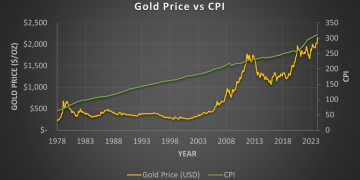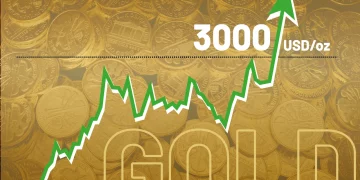Introduction: The Role of Expert Advice in Shaping Investor Behavior
In the world of investing, expert advice has always been a cornerstone for many financial decisions, particularly in volatile markets like that of gold and precious metals. For years, investors have turned to well-known analysts, economists, and financial institutions to guide them through the complexities of the market. But as market conditions grow more unpredictable, especially with the evolving geopolitical tensions and economic shifts in 2025, the question arises: Should you still follow the experts?
Gold has historically been a safe haven during times of uncertainty, but its price can swing dramatically due to a variety of factors. Expert opinions have often guided investors in these swings, but in recent years, some have begun questioning the reliability of expert forecasts. This article will explore the value of expert advice, the risks of blind following in 2025, and how you can adapt these insights to align with your own financial goals. We will also discuss the importance of building a hybrid investment strategy that combines both expert insights and personal discretion to make the most informed decisions.
The Role of Expert Advice in Shaping Investor Behavior
Historically, expert advice has been instrumental in shaping investor sentiment. From stock market analysts to economists and gold market specialists, these professionals provide valuable insights into potential price movements, market risks, and investment opportunities. By offering predictions based on data, historical trends, and market sentiment, experts can help investors navigate complex financial landscapes.
For instance, when gold prices surge or dip, experts weigh in with their analyses, often suggesting whether to buy or sell based on their understanding of market drivers such as inflation, currency fluctuations, or geopolitical instability. Many investors trust these opinions, relying on their extensive experience and deep understanding of the market to make informed decisions.
The downside of relying heavily on expert advice, however, is that it can lead to herd behavior. When experts strongly recommend buying gold, for example, a rush of investments can drive prices even higher. On the flip side, if experts predict a downturn and encourage selling, panic selling can exacerbate the price drop, creating unnecessary volatility in the market.
Why Blind Following Could Be Risky in 2025
As the world continues to face uncertainty in 2025, particularly with ongoing geopolitical tensions, inflation concerns, and unpredictable monetary policies, expert predictions about gold prices are increasingly divergent. Some analysts predict continued price surges, while others foresee a steep correction. The issue here is that market conditions are more dynamic than ever, and historical models used by experts may no longer be as accurate in predicting future price movements.
One of the primary reasons why blind following of expert advice is risky in 2025 is the growing volatility in the gold market. With the rise of alternative assets, such as cryptocurrencies and decentralized finance (DeFi) systems, the traditional forces that influenced gold prices are no longer as dominant. For example, central bank policies, which once heavily impacted gold’s price, have become more complex, with many countries diversifying their reserves into digital currencies or other forms of wealth storage.
Additionally, the geopolitical landscape is evolving rapidly, with emerging markets influencing the global economy in new ways. In the past, Western institutions held significant sway over gold markets, but as China, India, and other countries increase their presence in global gold trade, market dynamics are shifting. This can make traditional forecasting methods less reliable, as they may not fully account for the new influencers in the gold market.

Adapting Insights to Personal Financial Goals
Given these risks, it’s essential to adapt expert advice to suit your personal financial situation and investment objectives. While experts may offer valuable insights, they cannot account for the unique elements of your financial profile, such as risk tolerance, time horizon, or overall wealth strategy.
Before acting on any expert advice, it’s crucial to reflect on your own investment goals. Are you investing for long-term growth, or are you looking for short-term gains? If you’re focused on retirement or wealth preservation, it may be better to take a conservative approach to gold investing, diversifying your portfolio with a mix of assets to hedge against potential downturns. Conversely, if you’re looking to capitalize on short-term volatility, you may want to be more aggressive in your approach, which may include a larger allocation to gold or other commodities.
Additionally, consider the role of gold in your broader portfolio. While gold has historically been seen as a hedge against inflation and a store of value, it also comes with risks, including price swings and geopolitical uncertainty. Balancing gold with other assets—such as equities, bonds, or even real estate—can help reduce the potential downside while still offering exposure to gold’s upside potential.
Building a Hybrid Investment Strategy
In 2025, a hybrid approach to investing could be the key to navigating the uncertain markets ahead. By blending expert advice with personal discretion, you can create a strategy that maximizes your chances of success while minimizing the risks.
- Diversify Your Sources of Information: Relying on one or two expert opinions may limit your perspective. Instead, seek insights from multiple sources, including analysts with differing views on the market. This can help you gain a well-rounded understanding of the potential risks and rewards.
- Incorporate Fundamental and Technical Analysis: Both fundamental and technical analysis can provide valuable insights into gold prices. While expert opinions often rely on one or the other, a hybrid approach combines both to create a more comprehensive understanding of the market. Fundamental analysis looks at economic indicators such as inflation, GDP growth, and interest rates, while technical analysis focuses on price patterns and trends. By incorporating both approaches, you can better understand the forces driving gold prices.
- Stay Agile and Adapt: The ability to adapt to changing market conditions is essential in 2025. While expert predictions can offer guidance, they should not dictate your entire investment strategy. Stay informed and be prepared to adjust your portfolio based on evolving market conditions. This may involve increasing or decreasing your exposure to gold or diversifying into other assets as market dynamics shift.
- Focus on Risk Management: One of the most important aspects of any investment strategy is risk management. By setting clear parameters for your investments—such as a target price for buying and selling, or a stop-loss order to protect against large losses—you can mitigate the risks associated with volatility and market fluctuations.
Conclusion: Balancing Expert Insights with Personal Strategy
In 2025, blindly following expert advice in the gold market could be more risky than ever. While experts provide valuable insights, they cannot predict every market movement, especially in such an unpredictable global environment. By adapting their advice to your personal financial goals and incorporating both fundamental and technical analysis, you can build a more resilient and informed investment strategy. A hybrid approach, based on diversification and risk management, will help you navigate the uncertainty ahead, ensuring that your portfolio remains aligned with your objectives.
Remember, expert advice is just one piece of the puzzle. By taking a proactive and personalized approach to your investments, you can achieve a balanced strategy that aligns with both your financial goals and the evolving market landscape.
































